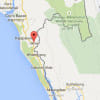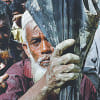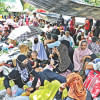Rohingya Shelters: Fear of health emergency
With shortage of food, water, medicine, sanitation and shelter in the Rohingya settlements in Ukhia and Teknaf, a public health emergency is just around the corner, Médecins Sans Frontières (MSF) said yesterday.
The Geneva-based international humanitarian organisation, which has been operating a health programme in the Rohingya camps, said it treated 487 patients for diarrhoeal diseases at Kutupalong between September 6 and 17.
"We are receiving adults everyday on the cusp of dying from dehydration. That's very rare among adults, and signals that a public health emergency could be just around the corner," Kate White, MSF's emergency medical coordinator, said in a statement.
Healthcare facilities – government or NGO – are overwhelmed by the sheer number of patients, it said.
Meanwhile, Health Minister Mohammed Nasim said over 16,000 Rohingya women have arrived pregnant.
Nurses and midwives in the government facilities have aided the delivery of 173 babies, the minister told a press conference at the ministry.
MSF clinics had received a total of 9,062 outpatients, 3,344 emergency room patients, 427 inpatients, 225 patients with violence-related injuries, and 23 cases of sexual violence.
Hundreds of thousands of refugees are living in an extremely precarious situation, and all the preconditions for a public health disaster are there, White said in the statement.
She also warned of a very high risk of an outbreak of infectious diseases.
Two of the pre-existing Rohingya settlements in Kutupalong and Balukhali in Ukhia have effectively merged into one densely populated mega-settlement of nearly 500,000 refugees, making it one of the largest refugee concentrations in the world, the statement said.
Makeshift settlements on side of roads and in the hilly terrains do not have sanitation and little potable water is available there. People are drinking water collected from paddy field puddles or hand-dug shallow wells often contaminated with excreta.
While the prices of food are skyrocketing, many Roingyas are only eating one meal of plain rice a day, the statement said.
The statement also quoted MSF Emergency Coordinator Robert Onus, "The situation in the camps is so incredibly fragile, especially with regard to shelter, food and water and sanitation, that one small event could lead to an outbreak that may be the tipping point between a crisis and a catastrophe."
MSF called for massive scale-up of humanitarian aid, a comprehensive vaccination campaign for measles and cholera to reduce the risk of an outbreak.
It will protect the Rohingya and Bangladeshi people in the area.
Health Minister Mohammed Nasim said a total of 52,605 Rohingya children were vaccinated for rubella and polio while 12,675 children were given vitamin A supplements.
Besides, government facilities have treated 2,364 Rohingyas for serious injuries, 7,969 for respiratory infections, 2,335 for skin diseases and 3,520 for diarrhoea.
The government is setting up 12 health centres at the Rohingya camps. 20 doctors, 12 nurses and other health personnel would be deployed at the centres.
Nasim said more than 40 private and international organisations are directly and indirectly involved in the services that include family planning.
Nasim urged the international community to put pressure on Myanmar to take back their citizens from Bangladesh.
Two additional hours of medicare on September 28
The health minister said government hospitals will provide two additional hours of service on September 28, the birthday of Prime Minister Sheikh Hasina.
“We decided to provide medicare at all government hospitals from 8:00 AM to 4.00 PM, instead of 8.00 AM to 2.PM.”
Relief materials coming in
King Salman Centre for Relief and Humanitarian Aid of Saudi Arabia has provided 100 tonnes of core relief items including food and materials for shelter.
IOM has chartered a Boeing 747 to bring the aid to Bangladesh today, said a press release.
Iran dispatched 29 tonnes of relief materials including tents, blankets and medicine. On September 15, Iran sent 41 tons of relief.

 For all latest news, follow The Daily Star's Google News channel.
For all latest news, follow The Daily Star's Google News channel. 








Comments